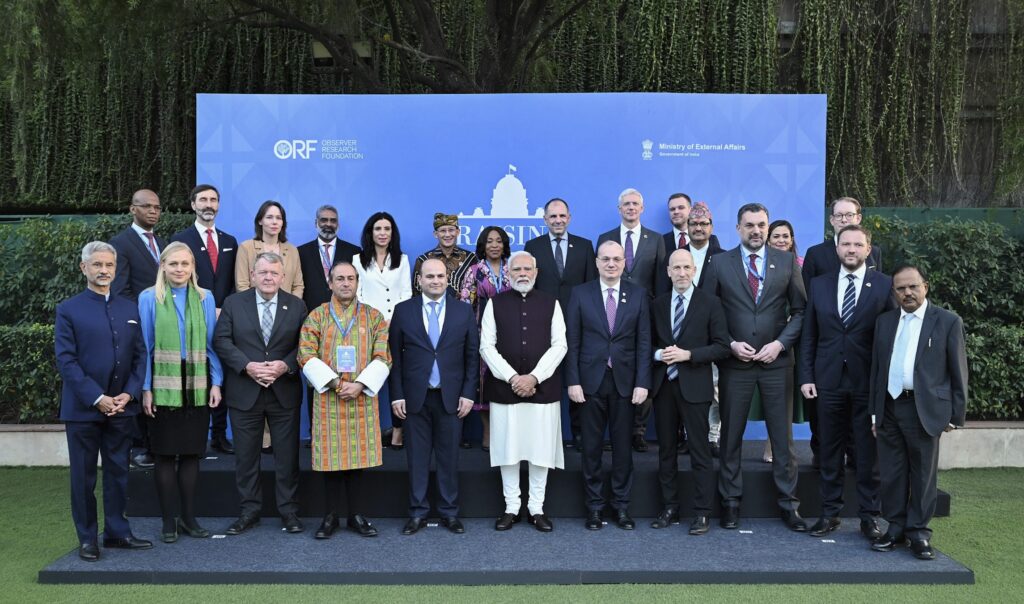India is working to secure the return of citizens who say they were conned into fighting for Russia in the war in Ukraine.
“We remain committed, as a matter of top priority, to actively pursuing with the Russian authorities all the relevant cases of Indian nationals for an early discharge from the Russian army,” the Indian External Affairs Ministry said in a Monday statement.
That statement came in the wake of Indian media reports that Russia had recruited young Indian men “to work as army helpers,” only for those people to be deployed to the front lines after coming under Russian control. The controversy has arisen amid a wider discussion between India and Western powers about New Delhi’s potential to aid Ukraine and increase pressure on Russia to curtail the war.
“India has also managed to maintain fairly good links on both sides,” Observer Research Foundation distinguished fellow Nandan Unnikrishnan told the Indian Express in a feature marking the second anniversary of the full-scale invasion. “When the war started, India was able to get Indian students out of Ukraine safely. And recently, there have been visits by Ukrainian ministers to India. Of course, historically, India has much stronger links with Russia. And that is likely to continue.”

The second anniversary of the war coincided with an international conference in New Delhi hosted by the Observer Research Foundation and the Indian External Affairs Ministry. The annual gathering, known as the Raisina Dialogue, featured extensive discussions of the war in Ukraine, including a series of overtures from Central and Eastern European officials keen to persuade India, and the wider Global South, to adopt a more supportive position toward Ukraine.
“In terms of the Global South, this war can be understood very simply as the war of colonialism: Russia is still an imperial power, whether we want to admit that or not, and they view Ukraine as their birthright,” Latvian Foreign Minister Krisjanis Karins said Friday during a Raisina Dialogue panel. “And they’re willing to kill all of them to prove their point.”
If the Latvian leader’s Indian interlocutors acknowledged that issue, one of his co-panelists nonetheless questioned the idea that the war “was unprovoked” and implied that the two sides could have negotiated a halt to the war even after the full-scale invasion.
“The disequilibrium on the international stage of weak Russia and an overextended United States works to China’s advantage; that is a matter that we watch very carefully here,” said retired Indian Ambassador D.B. Venkatesh Varma, who led the Indian Embassy in Moscow from 2019 to 2021. “The longer the Russia-Ukraine war continues, prolonged, it is not in India’s interest. … It has a huge global impact in terms of disequilibrium I was speaking about. So, we would wish that Europe finds a way of dealing with its security, rebuilding its security, but also finding a way of engaging with Russia.”
India has a long history of security ties to Moscow, dating back to a Cold War policy of “nonalignment.” But the reported recruitment of Indian manpower allegedly has the characteristics of human trafficking.
“The deal was that they would be given basic training for three months following which a psychological assessment and other tests will be done and willingness ascertained if they want to continue as kitchen helpers or any other job,” an unnamed recruiting “agent” told the Hindu, an Indian media outlet. “But after a month, their passports were snatched, and they were forced to fight on behalf of Russia. People from other countries are also stuck here.”
In the context of the war, Indian officials have balanced a variety of interests — importing Russian energy, for instance, but also applying pressure to dissuade Russia from using nuclear weapons against Ukraine. Yet New Delhi’s foreign policy posture has begun to shift in favor of cooperation with the United States, to Beijing’s irritation.
“The longer the Russia-Ukraine war continues, India and Europe will be competitors for the attention and resources of the United States of America,” he said.
CLICK HERE TO READ MORE FROM THE WASHINGTON EXAMINER
Karins, the Latvian foreign minister, maintained that a peace on terms that Russian President Vladimir Putin would appreciate would have wide-ranging negative consequences.
“Do we think it’s important to uphold international law and to stand up for Ukraine so that they can win and get the thief out of the bedroom?” he said. “Or do we say, ‘Eh, let’s let international law slip there. It won’t affect me.’ And my message is, unfortunately, it will. In one way or another, the ripple effect will affect everyone in this room, every country around the world.”
